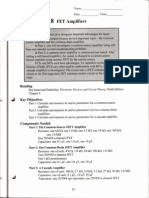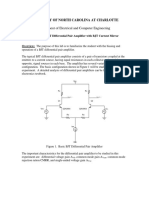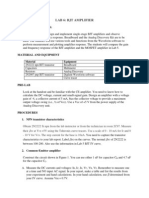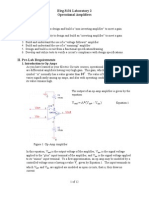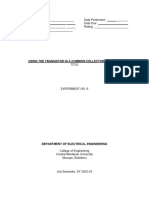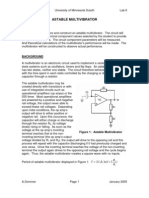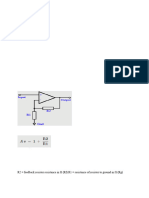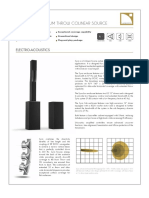L 5 B J T (B) - A: AB Ipolar Unction Ransistors JT Mplifiers
L 5 B J T (B) - A: AB Ipolar Unction Ransistors JT Mplifiers
Uploaded by
new_world55Copyright:
Available Formats
L 5 B J T (B) - A: AB Ipolar Unction Ransistors JT Mplifiers
L 5 B J T (B) - A: AB Ipolar Unction Ransistors JT Mplifiers
Uploaded by
new_world55Original Title
Copyright
Available Formats
Share this document
Did you find this document useful?
Is this content inappropriate?
Copyright:
Available Formats
L 5 B J T (B) - A: AB Ipolar Unction Ransistors JT Mplifiers
L 5 B J T (B) - A: AB Ipolar Unction Ransistors JT Mplifiers
Uploaded by
new_world55Copyright:
Available Formats
Lab 5
1
LAB 5 BIPOLAR JUNCTION TRANSISTORS (BJT)
AMPLIFIERS
LEARNING OBJECTIVES
By the end of this experiment, you should be able to:
- Compute the dc parameters, r
e
, and the voltage gain of a common-emitter amplifier
with voltage divider bias.
THEORY
Design of a current-gain-stabilized (|-Independent) voltage divider circuit
Rules of Thumb:
V
E
= 1/10 V
CC
R
2
s 1/10 |R
E
I
R1
~ I
R2
~ 10I
B
Based on the rule of thumb and the given parameter in the pre-lab assignment of
Experiment 7.
R
E
= V
E
/I
E
R
C
= V
RC
/I
C
= (V
CC
V
CE
V
E
)/I
C
V
B
= V
BE
+ V
E
= (R
2
V
CC
)/(R
1
+ R
2
)
Pick the resistors values from the standard series 1/8W and 1/4W with 5% tolerance, the
two digits: 10, 11, 12, 13, 15, 16, 18, 20, 22, 24, 27, 30, 33, 36, 39, 43, 47, 51, 56, 62, 68,
75, 82, and 91.
After the design, confirm that the selected values of resistors satisfy the following rules of
thumb:
- |R
E
> 10 R
2
- I
R1
~ I
R2
~ 10I
B
Lab 5
2
MATERIALS
Transistors: 2N3904 NPN
Resistors: < to be calculated in pre-lab assignment>
Capacitors: 2 1F, 1 100F
EQUIPMENT
- Tektronix PS280 DC Power Supply
- Fluke 45 Dual Display Multimeter
- Tektronix CFG 253 3MHz Function Generator
- Hewlett Packard Oscilloscope 100MHz 54600B
PRE-LAB ASSIGNMENT
1. In common-emitter amplifier in Figure: 5.1, let V
CC
= 30V, and R
L
= 10kO. Assume
V
BE
= 0.7V. Determine the values for R
1
, R
2
, R
C
, and R
E
so that I
C
= 1.94mA, I
E
=
1.95mA, I
B
= 11.09A, and V
CE
= 18.9V. Let |
dc
= 175, and |
ac
= 197.
2. Make LTSPICE/PSPICE runs to check the circuits that you have designed.
Lab 5
3
IN-LAB ACTIVITIES
1. Assemble the circuit (bias circuitry only, no signal and load) as shown in Figure 5-1,
by using resistor values, which you have determined.
Fig 5-1
2. Measure and record V
C
, V
B
, V
E
, V
BE,
V
CE
, I
C
, I
B
, and I
E
. Record all your results in
Table 5-1. Compare them with the pre-lab assignment results.
3. Set the function generator set for V
S
= 200mV
P-P
sine wave with a frequency of
1000Hz. Draw the input and output graph and record V
pp
, V
max
, V
min
, and V
rms
.
4. Measure the AC parameters V
i
and V
o
. Compute the (bypassed) voltage gain A
V
of
the amplifier, where
i
o
V
V
V
A = .
5. Remove capacitor C
2
from the circuit. Draw the input and output graph and record
V
pp
, V
max
, V
min
, and V
rms
.
6. Measure the AC parameters, V
i
and V
o
. Compute the (unbypassed) voltage gain A
V
of the amplifier.
Lab 5
4
RESULTS
V
C
(V) V
B
(V) V
E
(V) V
BE
(V) V
CE
(V) I
C
(mA) I
B
( A) I
E
(mA)
Table 5-1
Amplifier Gain
Bypassed:
Graph 5-1
V
p-p
= _________ V V
max
= ________V V
min
= ________V V
rms
= ________V
V
i
= V
V
o
= V
V ........V/ ..........
V
V
A
i
o
V
=
=
Volt/div Channel 1 =
________
Time/div =
___________
________
Volt/div Channel 2 =
________
Lab 5
5
Unbypassed:
Graph 5-2
V
p-p
= _________ V V
max
= ________V V
min
= ________V V
rms
= ________V
V
i
= V
V
o
= V
V ........V/ ..........
V
V
A
i
o
V
=
=
Volt/div Channel 1 =
________
Time/div =
___________
________
Volt/div Channel 2 =
________
Lab 5
6
LAB 5 REPORT
1. Compare and discuss the results for the bypassed and unbypassed voltage gain, A
v
as in
the experiments.
You might also like
- Eee334 Lab#1 Ltspice and Lab Orientation - Instruments and MeasurementsDocument9 pagesEee334 Lab#1 Ltspice and Lab Orientation - Instruments and Measurementsplaystation0% (1)
- Lab 7 (Cascaded Amplifier Design) - Sept 20Document8 pagesLab 7 (Cascaded Amplifier Design) - Sept 20WilfredNo ratings yet
- ENGN 2218 - HLab 1Document10 pagesENGN 2218 - HLab 1varshav_4No ratings yet
- Lab Experiment 8Document8 pagesLab Experiment 8Meredith Jensen0% (1)
- 1 BJTDiffPairLabDocument11 pages1 BJTDiffPairLaburim11No ratings yet
- Common Emitter Amplifier: S.No Name of The Component/ Equipment Specifications QtyDocument0 pagesCommon Emitter Amplifier: S.No Name of The Component/ Equipment Specifications Qtyagama1188No ratings yet
- OPERATION AMPLIFIER - Voltage Follower Configuration Learning OutcomeDocument3 pagesOPERATION AMPLIFIER - Voltage Follower Configuration Learning OutcomeAzriey HafizieyNo ratings yet
- AEC LabManualDocument30 pagesAEC LabManualPrateek PaliwalNo ratings yet
- Lab6 BJT AmplifierDocument5 pagesLab6 BJT Amplifierkostia1100% (1)
- Lecture13 BJT Transistor Circuit AnalysisDocument24 pagesLecture13 BJT Transistor Circuit Analysisazur33nNo ratings yet
- Electronics 1 Lab Manual PDFDocument30 pagesElectronics 1 Lab Manual PDFAnonymous 7y7TeR0% (1)
- Push Pull Ampilfier - c9Document4 pagesPush Pull Ampilfier - c9quynh04cdt1No ratings yet
- Course: Electronic Circuit Devices Lab No: 05 Title: Single Stage Common Emitter Amplifier Design CID: - DateDocument6 pagesCourse: Electronic Circuit Devices Lab No: 05 Title: Single Stage Common Emitter Amplifier Design CID: - DateAamir ChohanNo ratings yet
- Expt No 7 8Document3 pagesExpt No 7 8c.bhavesh2709No ratings yet
- ELEC3106 Lab 1 - Op-Amp MeasurementsDocument3 pagesELEC3106 Lab 1 - Op-Amp MeasurementsRuben CollinsNo ratings yet
- Integrators, Differentiators, and Simple Filters: 6. PrelabDocument15 pagesIntegrators, Differentiators, and Simple Filters: 6. PrelabMIn LeNo ratings yet
- Lab#2 OpAmps 110921 V1Document5 pagesLab#2 OpAmps 110921 V1FrenkiNo ratings yet
- Ecgr3156 Experiment 1 BJT Differential Pair With BJT Current MirrorDocument8 pagesEcgr3156 Experiment 1 BJT Differential Pair With BJT Current MirrorSargamNo ratings yet
- Ece02 Laboratory ManualDocument18 pagesEce02 Laboratory ManualChloe Felice Aguila PaelNo ratings yet
- Lab 1 Operational AmplifiersDocument12 pagesLab 1 Operational AmplifiersChris BrownNo ratings yet
- Exp 5Document7 pagesExp 5محمد المعايطةNo ratings yet
- Ecet Eca Lab ManualDocument47 pagesEcet Eca Lab ManualR RajenderNo ratings yet
- Lab 1-Bjt AmplifierDocument8 pagesLab 1-Bjt Amplifierhasnain3257100% (1)
- ECAD2 Complete ManualDocument37 pagesECAD2 Complete ManualJeremy HensleyNo ratings yet
- Experiment No: 04 Experiment Name: Summing Amplifire. Aim: To Design and Setup A Summing Amplifier Circuit With OP AMPDocument4 pagesExperiment No: 04 Experiment Name: Summing Amplifire. Aim: To Design and Setup A Summing Amplifier Circuit With OP AMPjif 1310No ratings yet
- Experiment 5Document10 pagesExperiment 5Meredith JensenNo ratings yet
- Long Report Lab 7Document15 pagesLong Report Lab 7Saragadam Naga Shivanath RauNo ratings yet
- Mini Project Arai HanisDocument28 pagesMini Project Arai HanisAzrai ZulkifliNo ratings yet
- Activity 9 Using The Transistor in A Common Collector AmplifierDocument4 pagesActivity 9 Using The Transistor in A Common Collector Amplifiers.diagbel.charlesiiNo ratings yet
- Summing AmplifiersDocument5 pagesSumming Amplifierscedgee100% (2)
- Activity 10 Using The Transistor in A Common Base AmplifierDocument4 pagesActivity 10 Using The Transistor in A Common Base Amplifiers.diagbel.charlesiiNo ratings yet
- Operational Amplifier LAbDocument17 pagesOperational Amplifier LAbAhmad DboukNo ratings yet
- BJT Amplifiers Frequency ResponseDocument29 pagesBJT Amplifiers Frequency ResponseKrista JacksonNo ratings yet
- Microsoft Word - Lic LabmanualDocument52 pagesMicrosoft Word - Lic Labmanualaarish-ramesh-5468No ratings yet
- Eet 224Document16 pagesEet 224brandonworsterNo ratings yet
- Lab 8 ManualDocument7 pagesLab 8 Manualazamat.duisembayevNo ratings yet
- AEC Lab ManualDocument70 pagesAEC Lab ManualRohan BoseNo ratings yet
- Lab 4 BJT-DC Biasing 1 1112Document10 pagesLab 4 BJT-DC Biasing 1 1112Mei GuanNo ratings yet
- Physics Investigatory ProjectsDocument36 pagesPhysics Investigatory ProjectsTushar Kush100% (4)
- Function Generator Op-Amp Summing Circuits Pulse Width Modulation LM311 ComparatorDocument7 pagesFunction Generator Op-Amp Summing Circuits Pulse Width Modulation LM311 ComparatorMuhammad JunaidNo ratings yet
- Lab 7 (Cascaded Amplifier Design) - Sept 20Document8 pagesLab 7 (Cascaded Amplifier Design) - Sept 20WilfredNo ratings yet
- EmtDocument115 pagesEmtRaj SharmaNo ratings yet
- Lab Report LicDocument14 pagesLab Report LicWINORLOSENo ratings yet
- Sonia 433 EmmiterfollowerDocument11 pagesSonia 433 EmmiterfollowermotswakekamogeloNo ratings yet
- Lica Lab ManualDocument53 pagesLica Lab ManualGowtham KannegantiNo ratings yet
- Cascode AmplifierDocument6 pagesCascode AmplifierRajesh NatarajanNo ratings yet
- Lab 2: Frequency and Time Response of Second Order Systems, Week of October 10, 2011Document9 pagesLab 2: Frequency and Time Response of Second Order Systems, Week of October 10, 2011Carlos ReyesNo ratings yet
- Lab 6Document10 pagesLab 6willstamp2003No ratings yet
- Complementary Push Pull Power Amplifier LabDocument3 pagesComplementary Push Pull Power Amplifier LabarupNo ratings yet
- Updated Manual - FinalDocument25 pagesUpdated Manual - FinalSaiyma Fatima RazaNo ratings yet
- Tc320 Lab Manual - 2013Document68 pagesTc320 Lab Manual - 2013Guillermo Castillo MarmolNo ratings yet
- Astable MultivibratorDocument3 pagesAstable MultivibratorTushar GuptaNo ratings yet
- 0 Lab6 Astable MultivibratorDocument3 pages0 Lab6 Astable Multivibratorchandu3072002No ratings yet
- Experiment 1 Non-Inverting Amplifier 9.1 ObjectiveDocument7 pagesExperiment 1 Non-Inverting Amplifier 9.1 Objectiveyoungdiana023No ratings yet
- Practice Session #03 High Pass RC CircuitDocument6 pagesPractice Session #03 High Pass RC Circuitharshit playboyNo ratings yet
- Design of Electrical Circuits using Engineering Software ToolsFrom EverandDesign of Electrical Circuits using Engineering Software ToolsNo ratings yet
- Reference Guide To Useful Electronic Circuits And Circuit Design Techniques - Part 2From EverandReference Guide To Useful Electronic Circuits And Circuit Design Techniques - Part 2No ratings yet
- Reference Guide To Useful Electronic Circuits And Circuit Design Techniques - Part 1From EverandReference Guide To Useful Electronic Circuits And Circuit Design Techniques - Part 1Rating: 2.5 out of 5 stars2.5/5 (3)
- Netmanias.2019.01.29 - 5G Traffic FlowDocument1 pageNetmanias.2019.01.29 - 5G Traffic FlowFiras Ibrahim Al-HamdanyNo ratings yet
- The Adapting 3-Terminal Voltage Regulators For Constant High Voltage Power SuppliesDocument5 pagesThe Adapting 3-Terminal Voltage Regulators For Constant High Voltage Power SuppliesHarsh VardhanNo ratings yet
- SequencerDocument26 pagesSequenceranon_942178333No ratings yet
- Fisk, Eliot - Interpreter's Notes Etude 1 (Frets Sep 81)Document1 pageFisk, Eliot - Interpreter's Notes Etude 1 (Frets Sep 81)Yip Alex50% (2)
- FLUID MECHANICS Multiple Choice QuestionsDocument8 pagesFLUID MECHANICS Multiple Choice QuestionsleGion0% (1)
- A Layman's Guide To Attitude Heading Reference Systems (AHRS) - Helicopter Maintenance MagazineDocument4 pagesA Layman's Guide To Attitude Heading Reference Systems (AHRS) - Helicopter Maintenance Magazinechakri1729No ratings yet
- Physics0625-01 (Start2016-Mayjun2023) Mcq+Core+Un-editedDocument1,118 pagesPhysics0625-01 (Start2016-Mayjun2023) Mcq+Core+Un-editedAHMADNo ratings yet
- Z2FS 6, 16, 22 Modular Throttle Check ValveDocument6 pagesZ2FS 6, 16, 22 Modular Throttle Check Valvenemi90No ratings yet
- MM Goods Movements With The Batch-Input InterfaceDocument11 pagesMM Goods Movements With The Batch-Input InterfaceSilva Silva0% (1)
- Winche Modelo ARS 403Document1 pageWinche Modelo ARS 403neilNo ratings yet
- TCP06 (Fluxo Maximo)Document4 pagesTCP06 (Fluxo Maximo)José Gui Naldo MuchangaNo ratings yet
- Medium Throw Colinear Source: Electro-AcousticsDocument6 pagesMedium Throw Colinear Source: Electro-AcousticsAnastasios Anax PavlidisNo ratings yet
- Introduction To Apache Pig: GeeksforgeeksDocument5 pagesIntroduction To Apache Pig: Geeksforgeeksamitsachan47No ratings yet
- Bridge Engineering Presentation (General)Document69 pagesBridge Engineering Presentation (General)yyanan1118No ratings yet
- Digital 1000 Ampere AC Clamp Meter HIOKI 3282Document2 pagesDigital 1000 Ampere AC Clamp Meter HIOKI 3282industrialindiaNo ratings yet
- Wireshark Lab: HTTP v8.0Document11 pagesWireshark Lab: HTTP v8.0Truonganh BaoNo ratings yet
- Incompressible Navier-Stokes RequirementsDocument13 pagesIncompressible Navier-Stokes Requirementsramy86No ratings yet
- Complex Vector Spaces PDFDocument42 pagesComplex Vector Spaces PDFmechmaster4uNo ratings yet
- AMM 15 ManualDocument16 pagesAMM 15 ManualJamirNo ratings yet
- Descriptive Stats 1Document35 pagesDescriptive Stats 1Simeony SimeNo ratings yet
- 05 Diesel Power PlantDocument78 pages05 Diesel Power PlantKanchha TamangNo ratings yet
- 3 Software RequirementsDocument41 pages3 Software RequirementsM KEERTHIKANo ratings yet
- Slide 06Document93 pagesSlide 06trantuan151204No ratings yet
- Statistics For Engineers (MAT2001) - SyllabusDocument3 pagesStatistics For Engineers (MAT2001) - Syllabusmanjeet kumarNo ratings yet
- Basic Detection Techniques Quasi-Optical TechniquesDocument39 pagesBasic Detection Techniques Quasi-Optical TechniquesArni SopiantiNo ratings yet
- 9TH SpreadsheetDocument11 pages9TH SpreadsheetClumsy ManNo ratings yet
- Iit-Jee W MarkDocument20 pagesIit-Jee W MarkVikas KumarNo ratings yet
- Biolaser CatalogDocument4 pagesBiolaser Catalogஅன்பழகன் αηβμNo ratings yet
- AI Project ListDocument6 pagesAI Project ListAnay BiswasNo ratings yet
- HMA Mix Design Report-2Document11 pagesHMA Mix Design Report-2yustinokwingwa100% (1)



